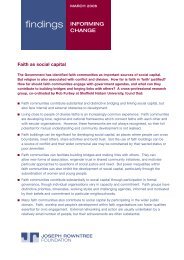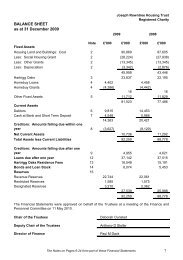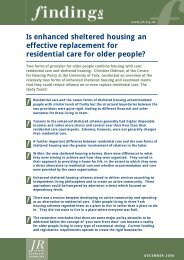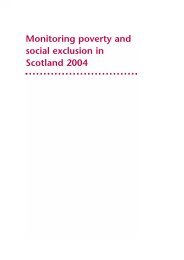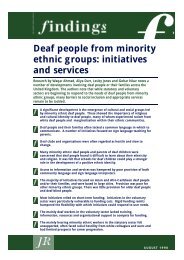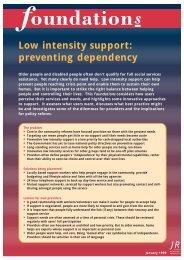Community participation - Joseph Rowntree Foundation
Community participation - Joseph Rowntree Foundation
Community participation - Joseph Rowntree Foundation
Create successful ePaper yourself
Turn your PDF publications into a flip-book with our unique Google optimized e-Paper software.
Understanding the links between <strong>participation</strong> in governance …<br />
frequently excluded from public spaces and institutions designed before the<br />
importance of their access needs were taken into account. 52<br />
Process design<br />
The design of opportunities for <strong>participation</strong> clearly influences the potential for social<br />
capital creation. 53 For example, a project exploring the perspectives of community<br />
members on <strong>participation</strong> in regeneration work revealed that the mechanisms for<br />
effective community involvement had been inadequate, with too little time for<br />
effective consultation. Many commented that there had been insufficient support and<br />
not enough training (a conclusion shared by many professionals). 54 Defining which<br />
issues are open to <strong>participation</strong> and the point in the policy cycle where <strong>participation</strong><br />
occurs is also important. 55 Moreover, the design of the process shapes not just the<br />
rules of the game but also who plays:<br />
The institutional arrangements of local governance influence not just ‘how<br />
much’ public <strong>participation</strong> exists; they also influence the distribution of<br />
opportunities to participate among different social groups. 56<br />
In particular, there is a role for institutions in mitigating the impact of factors<br />
associated with disadvantage and socio-economic status, through, for example,<br />
support for outreach and community capacity building in disadvantaged<br />
neighbourhoods.<br />
Organisational culture<br />
The cultures of participatory arrangements matter. As Taylor puts it:<br />
Public sector cultures are so deeply engrained that power holders are<br />
often unaware of the ways in which they perpetuate existing power<br />
relations through the use of language and procedures that outsiders find<br />
impenetrable. 57<br />
Assumptions made by officials and citizens can privilege knowledge and<br />
communication skills suited to official, bureaucratic decision-making environments,<br />
and alienate those who lack experience in those settings. 58 Where decision makers<br />
are prepared to be open and outward looking they are more likely to encourage<br />
public <strong>participation</strong>. An inward orientation, in which the agenda is defined by officials,<br />
17



